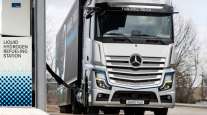Raising Brand Image Was Key Gain of His Tenure, Daimler Chief Says
This story appears in the April 1 print edition of Transport Topics.
LOUISVILLE, Ky. — Repositioning the Freightliner brand as a technology leader, and not just as the highest-selling truck nameplate in North America, is among the top achievements cited by Andreas Renschler as he prepared to step down as the head of Daimler Trucks Worldwide on April 1.
During a March 21 interview here during the Mid-America Trucking Show, Renschler also cited the strengthening of the Daimler Trucks brand worldwide and the successful creation of products that share a majority of parts, even as they are customized for global markets, as the highlights of his more than eight-year reign.
Daimler’s corporate leadership promoted Renschler from his stewardship of global truck operations to take over its ailing automobile and van production lines in late February; Renschler will switch jobs with Wolfgang Bernhard, in an unexpected move by the Stuttgart, Germany-based Daimler AG.
“Today, we are the leader of the pack [with the Freightliner brand]. We can get prices we couldn’t have dreamed of a couple of years ago, prices that show our technology, durability, quality” and reduced total cost of ownership for buyers, Renschler said.
When he took over in 2004, Renschler said, one of his charges was to improve profitability of what is now named Daimler Trucks North America, even if it meant losing market share in the process.
The company moved to cut production costs and to right-size its production capacity, as it moved to reduce the roller-coaster nature of the heavy-duty truck business, which rises and falls sharply along with the overall economy. It also moved away from guaranteeing buyback prices when fleets were ready to trade their truck in on new ones.
“We have a much more stable situation than when I started,” Renschler said. “Market share — I’m happy to have. But profitability is a very important part. Profitability is first, market share is second.”
After initially surrendering some market share, DTNA officials have said recently they intend now to build it this year.
While Freightliner has long been the largest-selling North American brand, Renschler said it didn’t have the reputation of a technology leader.
Company efforts to change that have led, among other things, to a new model being introduced this year, the Cascadia Evolution.
Company officials have said this truck will improve fuel efficiency by at least 7% above existing Cascadia models, and it incorporates the latest in weight-saving, aerodynamic innovations.
Under Renschler, Daimler moved to standardize its engine and drivetrain offerings.
“As global as possible, as local as necessary,” was his oft-heard mantra. As a result, Daimler’s truck engines around the world all now share about 80% of their components, which is a source of pride within the company.
During his tenure, Daimler also moved to begin providing the entire drivetrain and not just the cab and frame of its vehicles.
Daimler is in the process of beginning production of its automated manual transmission in the United States and is now producing axles and other components here, all under its Detroit brand.
DTNA President Martin Daum, who joined the interview, said there was initial internal resistance to Renschler’s move to standardize engines, but, Daum said, “He was absolutely right,” and eventually, all divisions joined the effort.
Globally, under Renschler, Daimler has moved to dominate two of what it sees as three distinct truck classes, according to Daum.
Daimler now aims to be No. 1 in technologically high-end trucks in the United States, Western Europe and Japan. It also intends to be a major player in what Daum called “the modern domestic market,” such as in India and China.
The segment where Daimler won’t compete, as of now at least, is the low end, where basic, low-priced vehicles dominate, such as in the developing countries of Africa and Asia.
Asked about goals that he wasn’t able to accomplish during his tenure, Renschler said, “We are a work in progress.” He said there was much more technology that he would like to have spread from one region to another — such as its virtual technician program from the United States to Europe — and additional things to standardize as part of a common powertrain platform.
He said Daimler Trucks’ future growth markets were going to be India, China and Russia.
The company has opened a plant in India to produce a line of trucks there under the BharatBenz nameplate, while it has joint ventures with local companies in China and Russia.
“Hopefully, business will grow here,” he said, “but the real growth will happen in emerging markets.”
Daum praised his outgoing boss for bringing “global respect” to the company, which he said included “instilling in us the necessity and deep conviction that global leverage is a key to success” of the enterprise. That meant accepting that all the “family members” contribute to the company’s direction and management, not just the officials in the home office.




